

Kelly Sikkema / Unsplash
Protein powders aren’t just for bodybuilders—the human body needs protein to build muscle and perform basic metabolic functions, and many adults don’t consume enough. If you eat a vegan diet, you may be searching for the best plant-based protein powder available.
Plant protein supplements are dried, powdered forms of protein that come from a variety of sources. They are often made from soy, rice, hemp, and peas, where other protein powders are derived from eggs or milk protein, such as whey or casein. Choosing the best plant-based protein powder for you depends on your lifestyle, dietary preferences, and taste buds. Here are our favorite vegan protein powder options.
Why Choose a Plant-Based Protein Powder?
There are several reasons to add a plant-based protein powder to your daily diet. They help support a healthy body composition as well as overall wellness, especially when paired with supplements to boost your immune system. If you’re looking to lose weight or gain muscle, a vegan protein powder can help. Depending on the brand and source you choose, these products can range from 10 grams of protein to upwards of 30 or 40 grams per serving.
When it comes to weight loss, a high-protein diet can help you feel fuller longer. This means you’re less likely to make unhealthy food choices or reach for snacks throughout the day. One scientific review study on overweight and obese patients suggests that supplementing with protein improved patients’ overall body composition and reduced risks associated with cardiovascular disease. Taking probiotic supplements or digestive enzymes can also help you get more nutrients from the foods you eat and lose weight.
On the muscle growth side of things, a second review study demonstrates a link between protein intake and increased muscle mass in weightlifters.
Yet gaining strength isn’t the only reason to enjoy a protein shake post-workout. Your fatigued muscles need protein to recover and rebuild after strenuous exercise. By feeding your body protein shortly after a workout, you may speed muscle recovery, reduce soreness, and increase the overall effectiveness of your workout.
On top of their nutritional benefits, plant-based protein powders, and plant-based diets in general, are better for the environment. Plant-based products typically take less energy and produce fewer emissions than animal-derived products and foods.
Our Favorite Vegan Protein Powder
Each product featured here has been independently selected by the writer. You can learn more about our review methodology here. If you make a purchase using the links included, we may earn commission.
- Best Tasting — Aloha Vanilla Protein Powder
- Best for Digestion — Sunwarrior Warrior Blend Organic
- Best Metabolism Booster — Your Super Organic Superfood Protein Mix
- Best for Muscle Growth — Onnit Plant-Based Protein
- Best for Keto Diets — NOW Sports Organic Pea Protein
Different Types of Protein Powder
There are several common types of protein powder on the market. These are the sources you’re most likely to encounter, including two that are dairy-based while the rest are plant-based protein powder.
- Hemp: Hemp is a complete plant protein source, which means it includes all nine amino acids that your body needs, but cannot make on its own. Hemp protein is also soy-free, so it’s a great choice for anyone with a soy allergy.
- Soy: Soy is a go-to protein source for anyone avoiding dairy. Like hemp, soy is also a complete protein.
- Pea: Pea protein is usually included in a blend with other plant-based protein sources. That’s because peas offer plenty of one important amino acid, arginine, but not enough of the remaining eight essential amino acids.
- Whey: Whey protein concentrate is probably the most common protein source on the market. Whey is a complete protein derived from milk that is readily absorbed by the body. Like most dairy products, all whey protein is not created equally. When shopping for a whey powder, look for one made with milk from grass-fed cows.
- Casein: Another dairy-based option, casein protein powder is more slowly digested than whey. It also contains a high concentration of glutamine, an amino acid linked to speedier muscle recovery. Casein is a good option for nighttime exercisers to enjoy after a workout.
In this article, we’re looking only at the best plant-based protein powder varieties.
How We Choose the Best Plant Protein
With a plethora of available plant proteins, it can be overwhelming to choose a plant protein that’s right for you. We made a list of the factors that we used to evaluate each plant-based protein brand.
Type of Protein — What kind of plant is the protein derived from? How much protein per serving does it have?
Ingredients — Does the protein powder contain artificial flavors or sweeteners?
Lab-testing — We choose brands that have their products third-party tested to guarantee the purity of the ingredients.
Value — How much does the powder cost? How many servings are in each container?
Our Favorite Plant-Based Protein Powders
Best Tasting: ALOHA Organic Vanilla Protein Powder
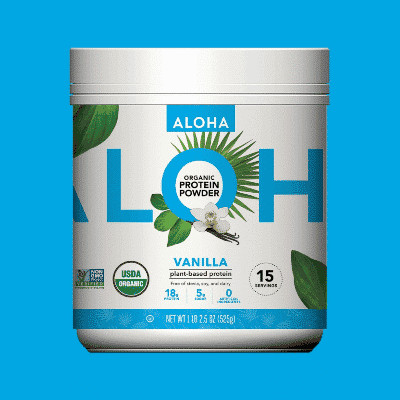
aloha.com
- Protein type – Pea protein, brown rice, hemp seed, and pumpkin seed proteins
- Protein amount – 18 g per serving
Why buy: We like that ALOHA plant-based protein powder features top-notch ingredients and is USDA organic, non-GMO, and certified vegan. It’s also gluten, dairy, and soy-free with no added sweeteners like Stevia. This product includes pea protein, brown rice protein, pumpkin seed protein, and hemp seed protein sources. Plus, ALOHA is a certified B-Corp.
Best for Digestion: Sunwarrior Warrior Blend Organic
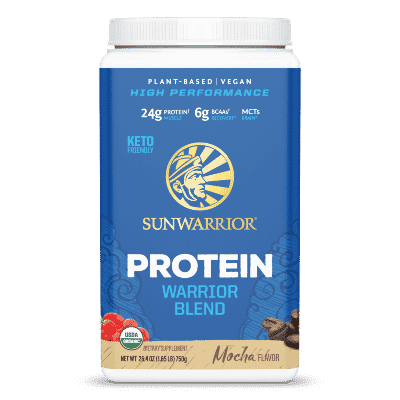
sunwarrior.com
- Protein type – Pea, organic hemp seed, and organic Goji berry proteins
- Protein amount – 24 g per serving
Why buy: Sunwarrior’s plant-based protein comes in five different flavors, so there’s a great-tasting option for everyone. The blend offers a complete amino acid profile and is made to be more bio-available making it easy to digest, plus keto and paleo-friendly, with fewer allergens than whey. We also love that it’s completely vegan and comes in a recyclable container.
Best Metabolism Booster: Your Super Organic Superfood Protein Mix
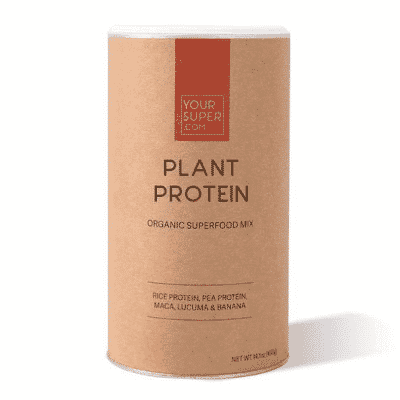
yoursuper.com
- Protein type – Organic rice and pea protein
- Protein amount – 9 g per serving
Why buy: Your Super makes a gluten, soy and dairy-free, non-GMO, and certified USDA organic plant protein that is a great option for those who want a metabolism booster. The simple, yet effective blend only uses five ingredients, including pea protein, rice protein, banana, maca, and lucuma. We love that Your Super also makes sure to source its ingredients sustainably.
Best for Muscle Growth: Onnit Plant-Based Protein
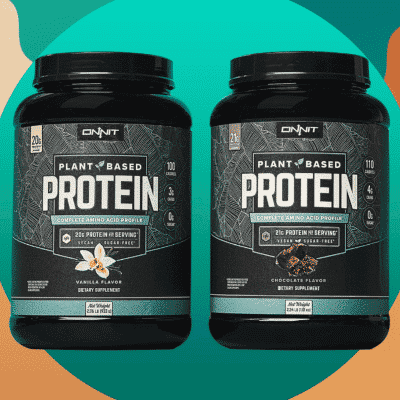
onnit.com
- Protein type – Pea, pumpkin, sunflower and watermelon seed proteins
- Protein amount – 20 g per serving
Why buy: Onnit’s plant protein powders use a branched-chain amino acid (BCAA), which is the most essential amino acid for muscle growth. The vegan blend is sugar, dairy, gluten, and soy-free, and offers a complete amino acid profile. We like that it comes in both vanilla and chocolate flavors, providing a more earth-friendly post-workout protein option.
Best for Keto Diets: NOW Sports Organic Pea Protein
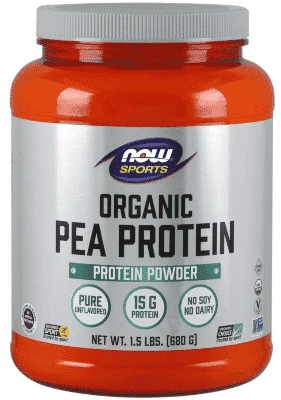
nowfoods.com
- Protein type – Pea protein
- Protein amount – 15 g per serving
Why buy: Pea protein is a good post-workout choice, and NOW Sports Organic Pea Protein powder offers 15 grams of vegetable protein isolate that is easy to digest. There are no artificial sweeteners, and it’s dairy, egg, soy and gluten-free. We like that this blend is certified USDA organic, keto-friendly, and GMP certified with testing results available online for every batch of protein.
How to Choose a High-Quality Plant-Based Protein Powder
When shopping for the best plant protein powder, there are some important things to take into consideration.
Start with your diet and taste preferences. There are plenty of vegan, gluten-free and soy-free protein products out there. If you have allergies, food sensitivities or a strong preference, start by narrowing your search there.
Secondly, consider the amount of protein you want, or need, to add to your diet. To find your personal Recommended Dietary Allowance (RDA) of protein, multiply your body weight in pounds by 0.36. For example, that’s 54 grams of protein per day for the average 180-pound male and 50 grams for the average 140-pound female.
That being said, athletes will have higher protein needs. If your diet is already rich in protein from meat, seafood, or plant-based foods, then a lower-strength protein powder might be sufficient for you.
On the other hand, if you’re highly active and don’t consume a high-protein diet, a powder that supplies 20 or 25 grams of protein can help you meet your RDA.
Finally, take a close look at the particulars of the powder itself. Many protein powders contain added sugars, fillers, and other unnecessary ingredients. Check the ingredient list. A short list that includes the main protein source at the top is a good sign.
What to Look For
Below are a few key attributes to look for when choosing a plant-based protein.
Many of these factors are personal preferences, but it’s important to consider what plant-based protein powder will most benefit your needs and wants.
Natural Ingredients
The specific protein used is an important part of the ingredient list but it’s important to consider what else is included in the formula. Make sure there are no extraneous fillers or artificial flavors or ingredients. Some protein powders also add in extra sugar, healthier proteins don’t use extra sugar or artificial sweeteners.
Amount of Protein
Some proteins will list the amount of protein per container, while others list the amount per serving. The amount of protein you consume on a daily basis depends on your activity, size, and gender.
Type of Protein
There are many types of plant-based proteins out there. Some brands make their proteins from just one plant-based protein, while others use a blend of many different proteins.
How to Read Labels
It’s important to read the label on everything we consume — including plant-based protein powders. Specifically, look into these elements:
- Certified Vegan: Make sure to check the label and nutritional information to see if it is 100% vegan. Most brands will include a symbol on the label to tell you.
- Ingredient List: Avoid supplements that include ingredients that are common allergens. It’s also important to look at how and where the protein is sourced. Look to see if the plant-based protein includes any additives, including sugar or artificial flavors.
- Amino Acid Profile: Plant-based protein powders that combine multiple sources of protein often offer a complete amino acid profile, meaning they contain all of the different types of proteins your body needs in one supplement.
- Amount: Reference the label to see how much protein is in each serving, as well as any additional nutritional information.
- Suggested Use: Some plant proteins are better before or after workouts. Many brands point out the suggested use of their product.
How to Use Plant Protein
Plant-based protein powders have a wide variety of uses: from people who are looking to supplement their diet to those who need it because of their high exercise regimen. People often use protein powders to increase muscle mass or for healthy weight gain. Plant-based protein powders are an especially great option for vegans or vegetarians to help them get their daily protein.
Most plant powders can be scooped into a glass of water or milk. Some people choose to add their protein powder to smoothies, or they bake with it. Protein powders are versatile and it’s up to you on how you want to consume them.
Safety and Side Effects
Researchers say that the average person should have 0.73 grams of protein per pound of body weight each day.
You should not exceed 2.3 grams of protein per pound per day because it can cause side effects such as:
- Ammonia in the blood
- Nausea
- Diarrhea
Takeaway
Plant-based protein powders are a great alternative to animal protein for those who are vegan, vegetarian or are just looking to reduce the number of animal products they consume.
They come in a variety of flavors, and can easily be added to smoothies, milk, water, or even be implemented in more creative ways such as stirring it into oatmeal or baking with the protein.
From super active people to people who just need more protein in their diets, plant-based protein powders are a great option.
Lizzy Briskin is the founder of Earthen Food Co. She is a chef, food writer, and recipe developer who helps people eat more mindfully for themselves and the environment, without overthinking it.
- 8 High-Protein Vegan Snacks You Can Take With You Anywhere ...
- 13 Nearly Complete Protein Sources for Vegetarians and Vegans ...
- Protein Shakes Can Help You Lose Weight and Boost Your ...
- 12 Best Foods to Eat in the Morning - EcoWatch
- A New Breed of Plant-Based Protein Aims to Compete on Meat-Centric Menus
- 7 Best Plant-Based Meal Replacement Powders of 2021 Reviewed

 233k
233k  41k
41k  Subscribe
Subscribe 